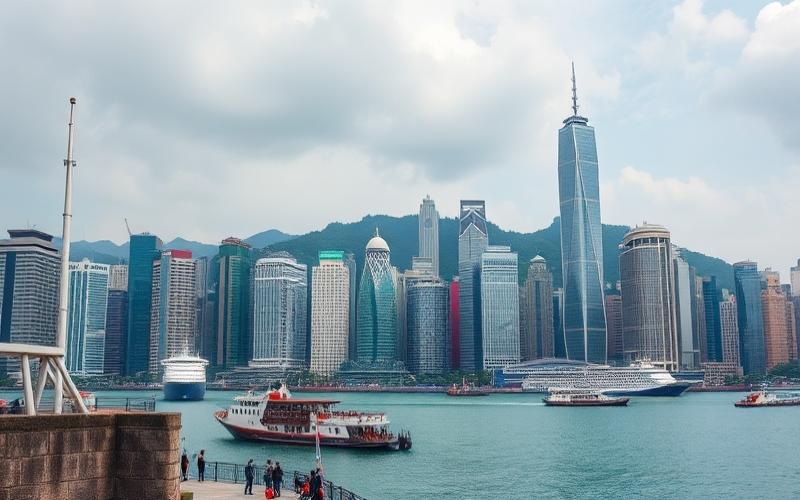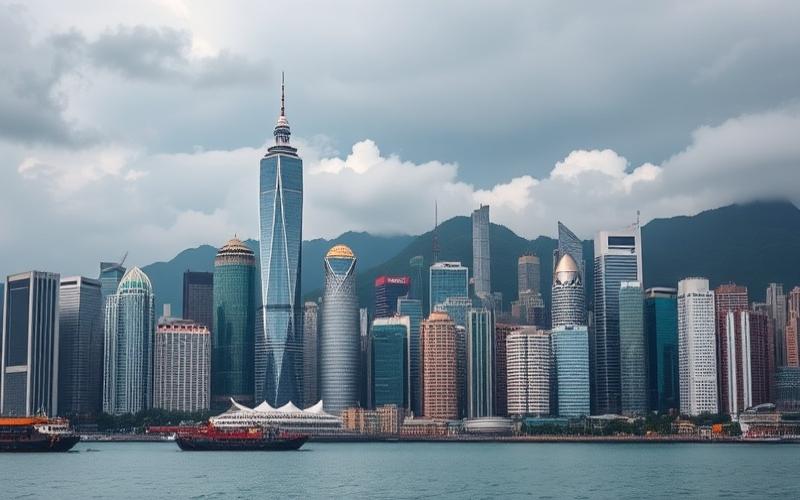
 Published on and written by Cyril Jarnias
Published on and written by Cyril Jarnias
Mandatory Insurance in Hong Kong: An Imperative for Real Estate Investors
Within Hong Kong’s unique real estate market, where skyscrapers frame a dense and competitive skyline, understanding mandatory insurance is crucial for every investor or property owner.
Essential Policies to Protect Your Assets
This comparison highlights the nuances of different essential policies, from home insurance to legal coverage, and reveals how these indispensable measures can protect your assets while optimizing your investment.
Good to Know:
Hong Kong ranks among the world’s most expensive real estate markets, making insurance protection even more critical.
A Strategic Necessity
As the city positions itself among the world’s most expensive real estate markets, obtaining the right insurance doesn’t just prevent unforeseen events—it becomes a strategic imperative for anyone aspiring to successfully navigate this urban maze.
Comparison of Home Insurance in Hong Kong
Overview of Home Insurance in Hong Kong
The Hong Kong market offers diverse home insurance options tailored to the needs of a dense urban environment exposed to specific natural risks like typhoons and floods. Key players include QBE Hongkong & Shanghai Insurance Limited, Prudential General Insurance Hong Kong Limited, Sompo Insurance (Hong Kong) Co. Ltd., AXA, and AIG Insurance Hong Kong Limited.
Mandatory Requirements Under Local Legislation
- Home insurance is not legally mandatory for private owners but may be required by banks for mortgage loans.
- Condominiums often require minimum coverage for common areas.
- Some policies include Liability coverage (damage caused to others).
Comparison of Main Offers
| Company | Main Coverage | Estimated Cost (per year) | Additional Services | Features/Advantages | Ratings/Customer Feedback |
|---|---|---|---|---|---|
| QBE | Personal property, Liability up to 10M HKD, loss of rent | ≈ 800-2,500 HKD | 24/7 assistance, e-claims, certified contractors | Coverage for buildings up to 50 years old, e-claims, panel of approved contractors | Satisfied with quick processing and digital service |
| AXA | Property, Liability, water/fire damage, theft | ≈ 900-3,000 HKD | Valuables protection, natural disaster extensions | Extensive network, customizable options | Good reputation, but claims processing sometimes considered slow |
| AIG | Property, Liability, natural disaster extensions | ≈ 1,200-3,500 HKD | Emergency assistance, temporary relocation coverage | Quick response to claims, extensive coverage | Positive feedback on disaster management |
| Prudential | Standard + valuables options, Liability, glass breakage | ≈ 1,000-2,800 HKD | Relocation assistance, precious items protection | Modularity, “all-risk” insurance possible | Good reputation, but prices slightly above average |
| Sompo | Personal property, Liability, domestic damage | ≈ 900-2,500 HKD | Multilingual customer service, 24/7 assistance | Expat-friendly, simple management | Appreciated for customer support |
List of Main Additional Services Offered
- 24/7 Assistance (plumbing, electrical, locksmith emergencies)
- Natural Disaster Protection (typhoon, flood, landslide)
- High Liability Coverage
- Digital Service (e-claims) for quick claims management
- Network of Approved Contractors for repairs without upfront costs
Usage Examples
- Water damage from a typhoon: insurance covers repairs, temporary relocation, and compensation for damaged property.
- Fire in a dense building: Liability coverage covers damage to neighbors, loss of rent is compensated during repairs.
- Burglary with theft of valuables: compensation for stolen items and coverage for lock replacement.
Importance of Choosing Suitable Insurance in Hong Kong
In a dense urban context, risks of claim propagation (fire, water damage) and evacuations are heightened. Comprehensive home insurance not only protects property but also against disputes with neighbors and financial losses related to property uninhabitability.
Customer Reviews and Public Ratings
- Recognized companies like QBE, AXA, and AIG are appreciated for their quick claims processing and clear offers.
- Customers value digital solutions and 24/7 assistance availability.
- Some criticize certain providers for lack of flexibility or extended processing times during major disasters.
Key Takeaway:
Thoroughly comparing natural disaster coverage, assistance quality, and claims management is essential for choosing home insurance suited to Hong Kong’s reality.
Good to Know:
In Hong Kong, home insurance typically includes coverage against fires, theft, and water damage—risks particularly heightened in this dense city. Insurance must meet minimum criteria under local legislation, often necessary for obtaining a mortgage. AXA, Prudential, and Manulife stand out for their broad range of guarantees and additional services, such as 24/7 assistance and protections against typhoons and earthquakes. Manulife, for example, is appreciated for its flexible policy customization options, while AXA is often recognized for its responsive customer service. Costs vary by neighborhood and property size, with average premiums observed around 1,000 to 2,000 HKD per year. Online comparison tools provide easy access to customer reviews, emphasizing that choosing appropriate insurance is crucial to avoid financial surprises in such a competitive market.
Liability Insurance: A Necessity for Property Owners
Liability insurance is considered essential for property owners in Hong Kong due to the high financial and legal risks associated with property ownership in a dense, vertical urban environment where incidents can quickly affect multiple parties.
Financial and Legal Risks Without Coverage:
- Without liability insurance, the owner must personally bear all costs related to damages caused to others (tenants, neighbors, passersby) by their property. These costs may include:
- Material repairs (water damage extending to a neighbor’s property).
- Medical expenses or compensation for injuries.
- Attorney fees and legal costs in case of prolonged disputes.
- Financial liability can reach several hundred thousand or even millions of HKD depending on the severity of the incident.
Concrete Examples Where Liability Insurance is Crucial:
- A water leak from the owner’s apartment damages the ceiling or property of the neighbor below.
- An electrical fault causes a fire affecting multiple residences.
- An accidental fall in common areas due to maintenance negligence attributable to the landlord.
| Situation | Consequence Without Insurance | Protection With Liability Coverage |
|---|---|---|
| Water damage to neighbor’s property | Full repair costs borne by owner | Covered by insurer |
| Tenant injury | Direct compensation | Legal/financial coverage |
| Fire originating from rented property | Risk of personal bankruptcy | Loss limitation |
Regulatory Comparison:
| Country/Region | Owner Liability Insurance | Mandatory Status |
|---|---|---|
| Hong Kong | Strongly recommended | Not legally mandatory |
| France | Mandatory for non-occupant owners* | Yes (condominiums) |
| Portugal | Mandatory for certain rental programs | Yes |
*Non-occupant owner
In many comparable European countries, the law mandates liability insurance at least for certain types of property owners (particularly those not residing on the premises). In Hong Kong, even if not generally imposed by law outside actively managed condominiums, it remains essential given the risks multiplied by urban density.
Implications During Disputes or Claims Without Protection:
- The owner faces having to finance all repairs or compensation claimed by a victim alone.
- In case of lengthy or complex legal proceedings: frequent inability for an average individual to bear all associated costs.
- Increased risk of real estate assets being seized or even liquidated to compensate a victim if no funds have been allocated through dedicated insurance.
In summary, obtaining liability insurance enables Hong Kong property owners to:
- Protect their assets against potentially catastrophic financial consequences; - Secure their relationships with tenants and neighbors; - Benefit from indispensable legal and financial support during major incidents in this urban context highly exposed to cross-risks among residents.
Good to Know:
In Hong Kong, liability insurance is indispensable for property owners due to the significant financial and legal risks they face without this coverage. Without adequate protection, accidental damages caused to tenants or neighbors, such as a water leak resulting in damage to an adjacent apartment, can lead to costly disputes. Compared to other regions, Hong Kong imposes strict legal responsibilities on property owners, similar to Singapore, making this insurance crucial to avoid exorbitant claims. Without protection, owners could be held personally liable for property damage or physical injuries, which could severely impact their financial situation in case of lawsuits.
Understanding Rental Risk Coverage
Rental risks refer to all incidents that may affect a rented property, such as material damage (fire, explosion, water damage) or financial losses related to the inability to rent the property. Covering these risks is crucial to protect the owner’s assets and ensure continuous enjoyment for the tenant in case of an incident.
Main Rental Risks Commonly Insured in Hong Kong:
- Material damage (fire, explosion, water damage)
- Loss of rent following an incident making the property uninhabitable
- Liability towards third parties and neighbors
- Theft or vandalism
- Specific risks related to technical installations (e.g., high-pressure gas)
Legal Obligations of Landlords and Tenants in Hong Kong:
| Party | Main Obligation | Examples/Comments |
|---|---|---|
| Landlord | Not legally required to systematically insure against rental risks | May contractually require the tenant to obtain insurance |
| Tenant | No general legal obligation unless specified in lease | Leases often include liability insurance requirements |
| All | Compliance with Landlord and Tenant (Consolidation) Ordinance for certain older residential properties | Increased control over technical safety in specific cases |
Local regulatory example:
For installations with particular risks (e.g., high-pressure gas), strict regulations exist on quantitative risk assessment to ensure it remains within “acceptable” thresholds defined by Hong Kong law. Any company operating such installations must prove it has taken all reasonable and economical measures to reduce these risks.
Comparison of Main Policies Available in the Hong Kong Market:
| Policy | Advantages | Limitations |
|---|---|---|
| Property All Risks | Broad accidental/material damage coverage | Frequent exclusions; high deductibles |
| Loss of Rent Insurance | Quick compensation after major incidents | Limited compensation period |
| Liability Insurance | Legal protection against third-party/neighbor claims | Doesn’t always cover all types of third-party damages |
Practical Tips for Choosing Rental Risk Insurance:
- Precisely analyze the nature of the rented property: commercial vs. residential use.
- Verify specific contractual requirements in the lease, particularly if a specific policy is required by the landlord.
- Consider the property’s actual value and its fittings to avoid underinsurance.
- Carefully compare deductibles, exclusions, and compensation limits between insurers.
- Ensure the chosen insurance complies with all obligations imposed by local regulations, especially if your property falls under a special regulated category.
Optimal coverage involves balancing comprehensive protection against all major incident types expected in Hong Kong with strict compliance with contractual and legal requirements applicable to the specific rental type concerned.
Good to Know:
In Hong Kong, rental risk coverage is crucial to protect landlords and tenants against unforeseen events such as material damage or loss of rent. Typically, it includes insurance for fires, water damage, and theft. Landlords are often legally required to obtain insurance covering the property structure, while tenants must insure their personal belongings. Local regulations often require leases to include insurance certificates. Within the Hong Kong market, insurance policies vary in coverage, cost, and customer service; main contracts include basic products with low prices and premium options offering expanded protection, but often at higher premiums. When choosing insurance, it’s crucial to consider coverage scope, possible exclusions, and the insurer’s reputation in terms of after-sales service to ensure optimal protection while meeting legal requirements.
Disclaimer: The information provided on this website is for informational purposes only and does not constitute financial, legal, or professional advice. We encourage you to consult qualified experts before making any investment, real estate, or expatriation decisions. Although we strive to maintain up-to-date and accurate information, we do not guarantee the completeness, accuracy, or timeliness of the proposed content. As investment and expatriation involve risks, we disclaim any liability for potential losses or damages arising from the use of this site. Your use of this site confirms your acceptance of these terms and your understanding of the associated risks.












































